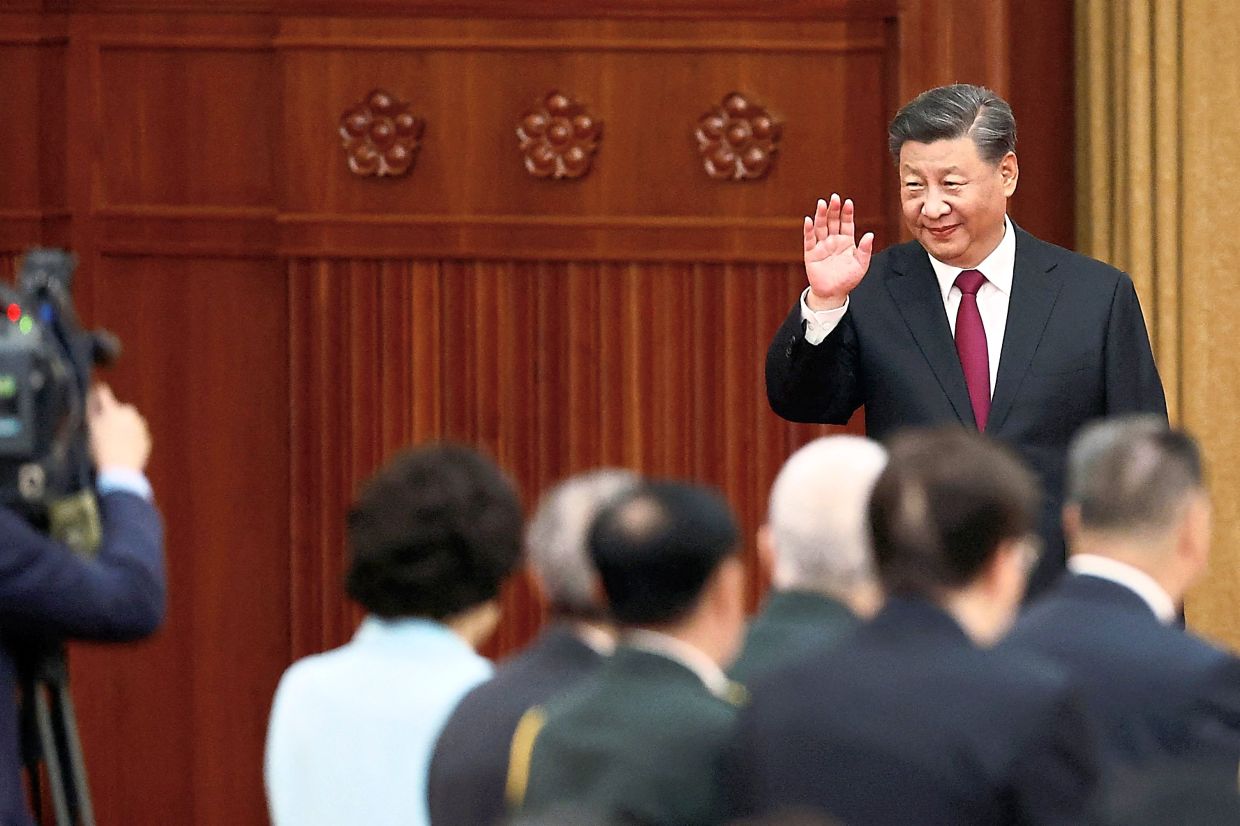
Free and footloose: Xi arriving at the Great Hall of the People on the eve of the Chinese National Day in Beijing, a few days after the many rumours and even some news reports of him being put under house arrest. – Reuters
MOST of us have become accustomed to reading fake news, especially on social media. These often have detrimental consequences when users accept such misinformation without verifying the content or lack the means to check if they are true.
Rumours have thrived on social media platforms for long, but last week, mainstream media resorted to the same despicable act when it reported the purported house arrest of Chinese president Xi Jinping.
It wasn’t news. It was a tale.
It was perhaps a case of wishful thinking by some anti-China media outlets, notably from Taiwan and India.
Western media like the CNN and BBC, which have been antagonistic towards China, were responsible enough to ignore this unverified claim.
Mainstream traditional media, especially old-fashioned newspapers, have always been the main source for verifying rumours that spread on social media. Journalists there are trained and have honed their skills to check and re-check the facts.
In this case, though, some mainstream media unashamedly joined in the frenzy to perpetuate the wild talk.
The rumour claimed that Xi had been arrested by the military, removed as the head of China’s People’s Liberation Army, and added that flights in Beijing airport had been cancelled and tanks were rolling on the streets.
A retired Malaysian journalist first alerted me about the rumour and asked me to check with my China contacts in the media and diplomatic circles.
I asked where he had read this, and he said: “Epoch Times.” That was an immediate red flag. The Epoch Times is a right-wing, anti-China media organisation based in Washington DC and funded by Falun Gong.
Falun Gong is a hugely followed religious movement but is banned by the Malaysian government. It’s also known for staging protests outside Chinese embassies worldwide.
Epoch Times’ matching opponent must be China’s Global Times, with its nationalistic pro-Communist views, using strong rhetorical language in its coverage.
According to veteran Hong Kong-based journalist Nury Vittachi, the red faces in the media included those in the Australian edition of The Spectator, a British magazine.
“Where there’s smoke there’s fire, as they say, and there is a column of smoke – the likes of which haven’t been seen since July 64 AD – pouring out of Beijing,” it reported.
July 64 AD was when Rome burned under Nero, and the magazine certainly would have hoped that Beijing was razed to the ground, too.
Vittachi wrote that “in India, it reached the list of top three biggest stories despite not containing a word of truth,” name checking Hindustan Times, Zee News, India Today, Daily News and Analysis. And this would surely include NDTV, a New-Delhi based television station.
Vittachi added “many versions included the information that there was no evidence for the story but omitted the fact that under the most basic rules of journalism, stories with zero evidence would normally not be considered printable.”
He traced the source of the tittle-tattle to a Falun Gong activist, Jennifer Zeng, and anti-China campaigners based in the US. There were even Twitter video postings depicting purported “big explosions”.
Strangely, no one bothered to check with Chinese state-owned broadcaster CCTV, as evidenced by a newsclip and video showing Xi Jinping at an exhibition on the milestones of the Communist Party of China at the Beijing Exhibition Hall.
He was at the venue on Sept 27 and the story in English was uploaded at 11.50pm by Xinhua news agency while CCTV put the news online, in Chinese, at about 7pm.
The frenzy about the alleged house arrest had been going on since Sept 24, yet most of these media outlets ignored his appearance at the exhibition, presumably to save their blushes. They pretended it didn’t happen.
The West, especially the US and UK, have long had a skew in their coverage of China, beginning with the Covid-19 virus, which was blamed on the Wuhan wet market, yet remains unproven. Some even said the virus was created in Chinese labs. That was followed by the “pro-democracy” protests in HK, which they claimed was “peaceful” despite the blatant attacks.
India, meanwhile, has a long acrimonious history with China, culminating in border clashes even. Although it prides itself as the world’s largest democracy, along with the US, the truth is it hasn’t competed with the economic progress and wealth of China.
Both sides are happy to run China down whenever opportunity knocks, and what better story than talk of Xi Jinping being arrested, never mind its veracity.
As the saying goes among some editors – never let the facts spoil the story.Even coverage of the Ukraine War by international news agencies has been lopsided. Unfortunately, though, the rest of the world’s media has no choice but to subscribe to these news agencies because they simply lack the means to send correspondents to war-torn areas.
So, what do most of us do? We refer to pro-Moscow news agency, Russia Today, but cautiously and objectively.
Luckily in Malaysia, we have access to RT, unlike in many European nations which only preach freedom of speech and the right to information.





